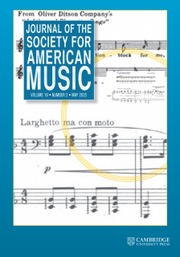Article contents
Apart Playing: McCoy Tyner and “Bessie's Blues”
Published online by Cambridge University Press: 16 May 2007
Abstract
Jazz pianist McCoy Tyner's improvisation on the theme “Bessie's Blues,” recorded with the John Coltrane Quartet in 1964, exemplifies the traditional Afrodiasporic performance practice of “apart playing.” A formulation of the art historian Robert Farris Thompson, apart playing occurs whenever individual performers enact different, complementary roles in an ensemble setting. For interpretative purposes, the concept helps to provide a cultural context for certain pitch-based formal devices, such as substitute harmonies and playing “outside” an underlying chord or scale, which Tyner uses in the course of his solo.
- Type
- Articles
- Information
- Copyright
- © 2007 The Society for American Music
References
Discography
- 3
- Cited by


